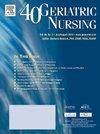探索患有慢性病的老年人焦虑的风险和保护因素:纵向分析
IF 2.5
3区 医学
Q3 GERIATRICS & GERONTOLOGY
引用次数: 0
摘要
本纵向研究旨在探讨与焦虑相关的风险和保护因素,以便根据老年人不断变化的需求为其量身定制支持性服务。方法利用全国健康与老龄化趋势研究(NHATS)的第 5-9 轮研究,对 3541 名老年人进行了研究。利用压力与应对的交易理论(TTSC)模型来选择预测因素。结果年龄、性别、婚姻状况、收入、种族和民族、自评健康状况、慢性病数量、认知能力、负面情绪频率、自我实现、自我效能感和复原力、活动参与度和技术使用与焦虑有显著相关性。结论研究结果强调了将资源与护理人员联系起来的必要性,并呼吁进行有效的慢性病管理。医疗保健提供者的建议、健康生活方式的正确教育以及参与更多体育活动也能起到作用。本文章由计算机程序翻译,如有差异,请以英文原文为准。
Exploring risk and protective factors for anxiety in older adults living with chronic conditions: A longitudinal analysis
Objective
This longitudinal study aims to explore risk and protective factors associated with anxiety to tailor supportive services for older adults according to their changing needs.
Methods
Utilizing rounds 5–9 of the National Health and Aging Trends Study (NHATS), 3541 older adults were studied. The Transactional Theory of Stress and Coping (TTSC) model was utilized to select predictors. Descriptive analysis was conducted and a Generalized Estimating Equation (GEE) was applied.
Results
Age, gender, marital status, income, race and ethnicity, self-rated health, number of chronic conditions, cognitive capacity, frequency of negative feelings, self-realization, self-efficacy and resilience, activity participation, and technology use were significantly associated with anxiety. However, anxiety did not change over time.
Conclusions
The findings highlight the need to link resources to caregivers and call for efficient chronic condition management. Recommendations from healthcare providers, proper education of healthy lifestyle, and engaging in more physical activities can also make a difference.
求助全文
通过发布文献求助,成功后即可免费获取论文全文。
去求助
来源期刊

Geriatric Nursing
医学-护理
CiteScore
3.80
自引率
7.40%
发文量
257
审稿时长
>12 weeks
期刊介绍:
Geriatric Nursing is a comprehensive source for clinical information and management advice relating to the care of older adults. The journal''s peer-reviewed articles report the latest developments in the management of acute and chronic disorders and provide practical advice on care of older adults across the long term continuum. Geriatric Nursing addresses current issues related to drugs, advance directives, staff development and management, legal issues, client and caregiver education, infection control, and other topics. The journal is written specifically for nurses and nurse practitioners who work with older adults in any care setting.
 求助内容:
求助内容: 应助结果提醒方式:
应助结果提醒方式:


